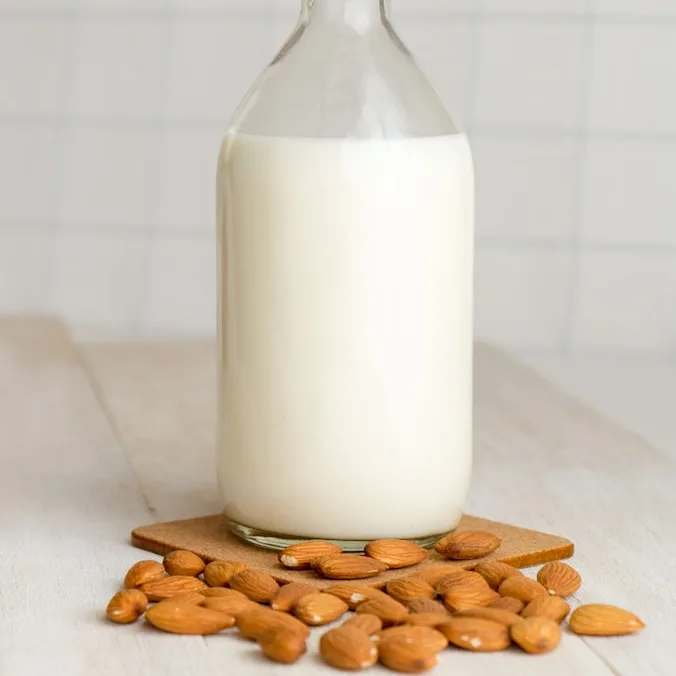Table of Contents
It’s a terrific day to be alive for anyone who is vegan, has a dairy allergy, or doesn’t like normal cow milk. There are a ton of milk substitutes available, and restaurants and coffee shops are starting to carry more of them. There are many options available in grocery shops, including soy, oat, rice, and coconut milk.
Moreover, a wider variety of products, such as hemp, pea milk, and walnut milk, may be found in many health food stores. However, when it comes to popularity, one kind tends to dominate the others: almond milk. But quality isn’t always synonymous with popularity. Depending on their dietary requirements, almond milk might not be the best option for everyone, despite its deliciousness and versatility. This is a sincere examination of almond milk.

Advantages of Almond Milk
Let’s start with the advantages. Water and whole almonds, or almond butter, are used to make almond milk. It is a natural source of vitamin E and has less fat and calories than cow’s milk. It can be used in place of dairy milk in baked goods, smoothies, cereal, and other applications. But there are a few possible disclaimers to be aware of.
Not enough protein
The body needs protein for several functions, including the development of muscles, enzyme synthesis, and bone construction. Almond milk has only one gram per cup compared to eight in cow’s milk. However, soy milk has 7 grams of protein per cup if you’re looking for a high-protein, dairy-free substitute.
Deficient in nutrients
Even though milk is primarily composed of water, the nutritional content of almonds remains unchanged, despite almonds being regarded as a superfood. As indicated before, one cup only has 39 calories, 3 grams of fat, and 1 gram of protein. You can search for almond milk brands that are supplemented with different vitamins and minerals or that contain 7–15% almonds for enhanced nutritional value. As an alternative, you could choose soy, pea, or oat milk substitutes.
Not suitable for young children
Almond milk is insufficient to support an infant’s growth due to its poor nutritional content. In fact, infants younger than a year old may not be able to absorb iron from cow’s or plant-based milks. Infants should only be fed breastmilk or formula until they are 4 to 6 months old, at which point they can start eating solid food, according to experts. If a parent wants to avoid giving their child dairy products, they should ask their pediatrician for suggestions on non-dairy infant formula.
Possibly include additions
Additives include sugar, salt, gums, lecithin, and emulsifiers can be found in processed almond milk. While some prefer to avoid them, the latter substances are thought to be harmless. In the meantime, excessive sugar consumption has been linked to several health problems. It is therefore preferable to select unsweetened non-dairy milk varieties.
Not recommended for those who have allergies
For those who are allergic to nuts, almond milk—as well as hazelnut, walnut, cashew, and other types of milk—is not recommended.
Not good for the environment
Almond milk may cause those who opt to abstain from dairy products because of environmental concerns to reconsider their decision. Four factors need to be taken into account when evaluating a product’s environmental impact: freshwater usage, land use, greenhouse gas emissions, and eutrophication (the contamination of ecosystems with excess nutrients). Almond milk requires a significant amount more freshwater than rice, oat, or soy milk.
Not very good with coffee
Almond milk comes in a variety of forms, and not all of them pair well with coffee. Certain types should not be used with tea or coffee because the milk solids separate when they are added to heated liquids. Additionally, it could not foam as well as cow’s milk. Thus, be sure to use almond milk prepared like a barista or creamier plant-based milks like oat or coconut.
Challenging to cook with
Furthermore, almond milk is likely to split when cooked if it does so in coffee. In fact, some varieties become bitter when heated. As a result, if you’re adding almond milk to soup or something similar, you should add it at the end of the process. Alternatively, choose a brand of almond milk or another non-dairy milk that is more appropriate for the recipes you’ve chosen.
read also : Best ways to eat nuts, which have the highest protein content
9 Reasons You May Want To Avoid Drinking Almond Milk (msn.com)

